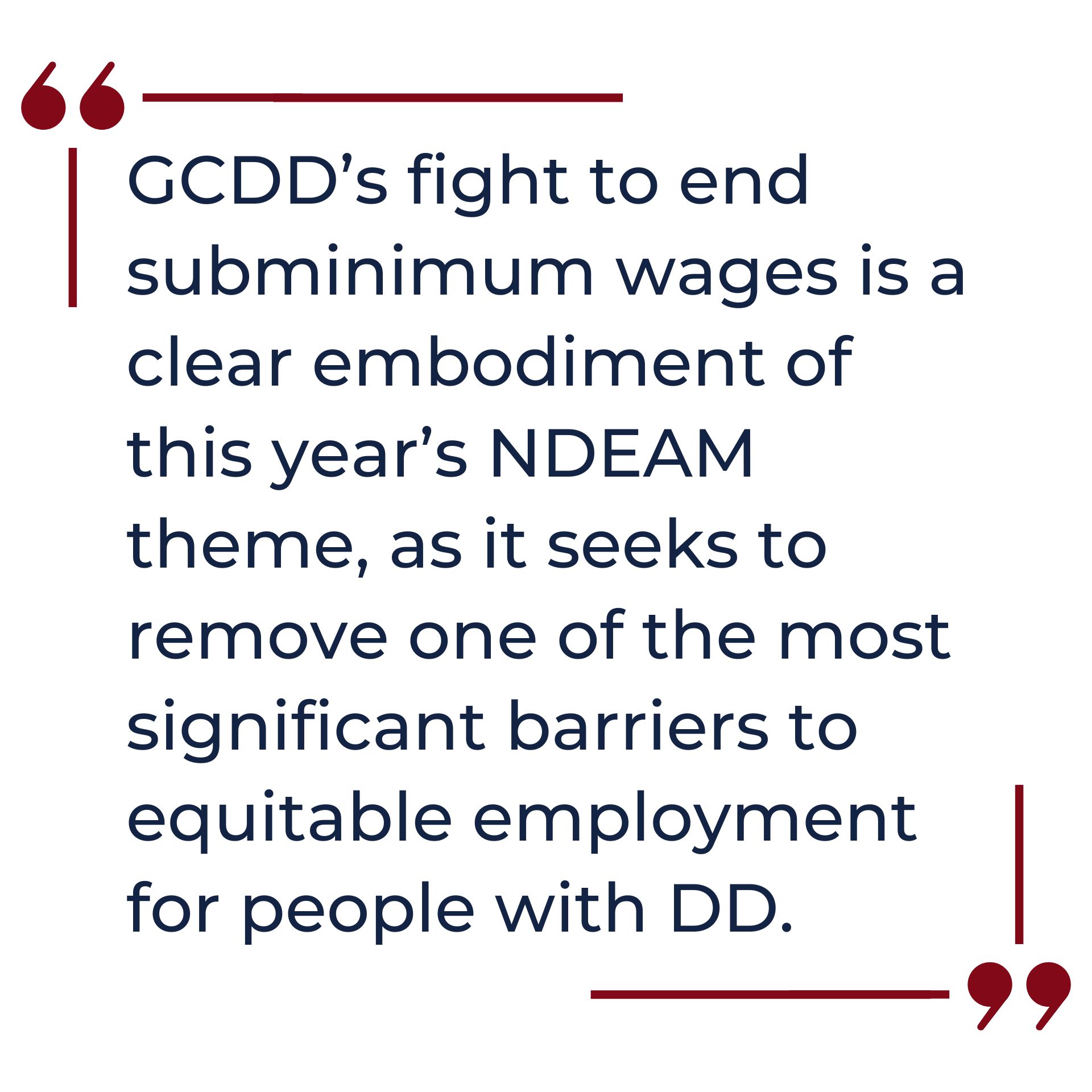GCDD’s Fight to End 14(c) Certificates and Subminimum Wages: A Key Initiative for National Disability Employment Awareness Month
 Charlotte Densmore, GCDD Public Policy DirectorAs the month of October ushers in National Disability Employment Awareness Month (NDEAM), organizations across the nation come together to recognize the critical contributions of workers with disabilities, promote inclusive employment practices, and raise awareness about the work that remains to be done to ensure equitable opportunities for all. The Georgia Council on Developmental Disabilities (GCDD) has long been at the forefront of advocacy for developmental disabilities (DD). One of the most significant efforts spearheaded by GCDD is the push to end the use of 14(c) certificates and the practice of paying subminimum wages to workers with disabilities in the state. This campaign is not only pivotal to disability rights within Georgia, but it also unites perfectly with the broader aims of NDEAM.
Charlotte Densmore, GCDD Public Policy DirectorAs the month of October ushers in National Disability Employment Awareness Month (NDEAM), organizations across the nation come together to recognize the critical contributions of workers with disabilities, promote inclusive employment practices, and raise awareness about the work that remains to be done to ensure equitable opportunities for all. The Georgia Council on Developmental Disabilities (GCDD) has long been at the forefront of advocacy for developmental disabilities (DD). One of the most significant efforts spearheaded by GCDD is the push to end the use of 14(c) certificates and the practice of paying subminimum wages to workers with disabilities in the state. This campaign is not only pivotal to disability rights within Georgia, but it also unites perfectly with the broader aims of NDEAM.
Understanding 14(c) Certificates and Subminimum Wages
The 14(c) provision of the Fair Labor Standards Act (FLSA), established in 1938, allows employers to pay workers with disabilities less than the federal minimum wage, based on the assumption that their productivity may be lower than that of their non-disabled peers. This policy, now over 85 years old, was intended to create more employment opportunities for people with significant disabilities. However, in practice, it has often resulted in exploitation, leaving workers with DD earning far below the poverty line for jobs that offer little opportunity for advancement.
While some argue that 14(c) certificates provide a pathway to employment for those with the most significant barriers to work, the reality is that many workers with disabilities are capable of competitive, integrated employment when given the proper support. GCDD, along with a growing coalition of advocates across the country, recognizes that subminimum wages perpetuate inequality and outdated notions of disability. As the nation focuses on advancing workplace inclusion during NDEAM, GCDD’s mission to eliminate 14(c) certificates aligns with the larger goal of creating equitable employment opportunities for all people, regardless of ability.
GCDD’s Role in the Fight Against Subminimum Wages
GCDD has long been a champion of policies that promote competitive, integrated employment (CIE) for individuals with DD. Through a combination of legislative advocacy, public awareness campaigns, and coalition-building efforts, GCDD has worked to dismantle the system of subminimum wages in Georgia and create pathways for people with disabilities to access meaningful employment at fair wages.
One of GCDD’s primary strategies has been to engage state legislators in conversations about the harmful effects of 14(c) certificates and the need for policy change. In 2024, GCDD advocated for HB 1125, a bill that sought to phase out subminimum wages in the state, a crucial step in aligning Georgia with a national trend of states moving away from this archaic practice. Although the bill did not pass that session, GCDD’s advocacy efforts laid the groundwork for future legislative action, and there are plans to reintroduce the bill in 2025.
In addition to legislative efforts, GCDD has prioritized raising awareness about the importance of employment equity for people with disabilities. Through partnerships with local organizations, community outreach programs, and media campaigns, GCDD educates both the public and policymakers about the benefits of competitive employment for individuals with DD and the negative consequences of keeping subminimum wage laws in place. These awareness campaigns are particularly powerful during NDEAM, as the nation’s attention turns toward disability employment and the need for systemic change.
Aligning with National Disability Employment Awareness Month (NDEAM)
National Disability Employment Awareness Month is an opportunity to celebrate the achievements of workers with disabilities while also acknowledging the persistent barriers they face in the workforce. This year’s NDEAM theme, “Access To Good Jobs for All,” highlights the importance of providing access and creating inclusive environments where individuals of all abilities can thrive. GCDD’s fight to end subminimum wages is a clear embodiment of this year’s theme, as it seeks to remove one of the most significant barriers to equitable employment for people with DD.
NDEAM serves as a powerful platform for amplifying GCDD’s message. Throughout October, GCDD leverages this national observance to draw attention to the importance of policy reform and the real-world impact that subminimum wage laws have on individuals with disabilities. By sharing stories of workers who have successfully transitioned out of sheltered workshops and into competitive employment, GCDD humanizes the issue and demonstrates that people with disabilities can contribute meaningfully to the workforce when given the chance.
Moreover, GCDD uses NDEAM as an opportunity to bring together stakeholders from across the state to discuss strategies for improving employment outcomes for people with disabilities. These discussions often include representatives from state agencies, disability advocacy groups, businesses, and educational institutions, all working together to create a more inclusive employment landscape. The momentum generated during NDEAM helps fuel GCDD’s year-round efforts to push for legislative reform and increase access to employment for individuals with DD.
National Trends and the Future of Subminimum Wage Laws
GCDD’s efforts are part of a larger national movement to end the use of 14(c) certificates and subminimum wages for workers with disabilities. Across the country, states are beginning to recognize that this outdated practice no longer aligns with modern values of equity and inclusion. States like Alaska, Maine, and Maryland have already abolished subminimum wages, and several others are in the process of doing the same.
In 2021, the Biden administration proposed eliminating 14(c) certificates as part of its American Jobs Plan, signaling federal support for ending the subminimum wage system. Although the proposal has not yet passed into law, it underscores the growing consensus that subminimum wages are no longer acceptable in a society that values the rights of all workers.
GCDD is committed to keeping Georgia at the forefront of this national movement. As part of our long-term strategy, GCDD continues to work with advocates, legislators, and business leaders to phase out subminimum wages in Georgia and ensure that all workers with disabilities are paid fairly for their labor. This work is crucial to ensuring that Georgia’s policies reflect the values of inclusion and equity that NDEAM promotes.
This October, as we celebrate NDEAM, let us recognize the vital work being done by advocates to ensure that all individuals, regardless of their abilities, have the opportunity to participate in the workforce with dignity and fairness. Ending subminimum wages is not only a matter of economic justice; it is a necessary step toward creating a truly inclusive society.